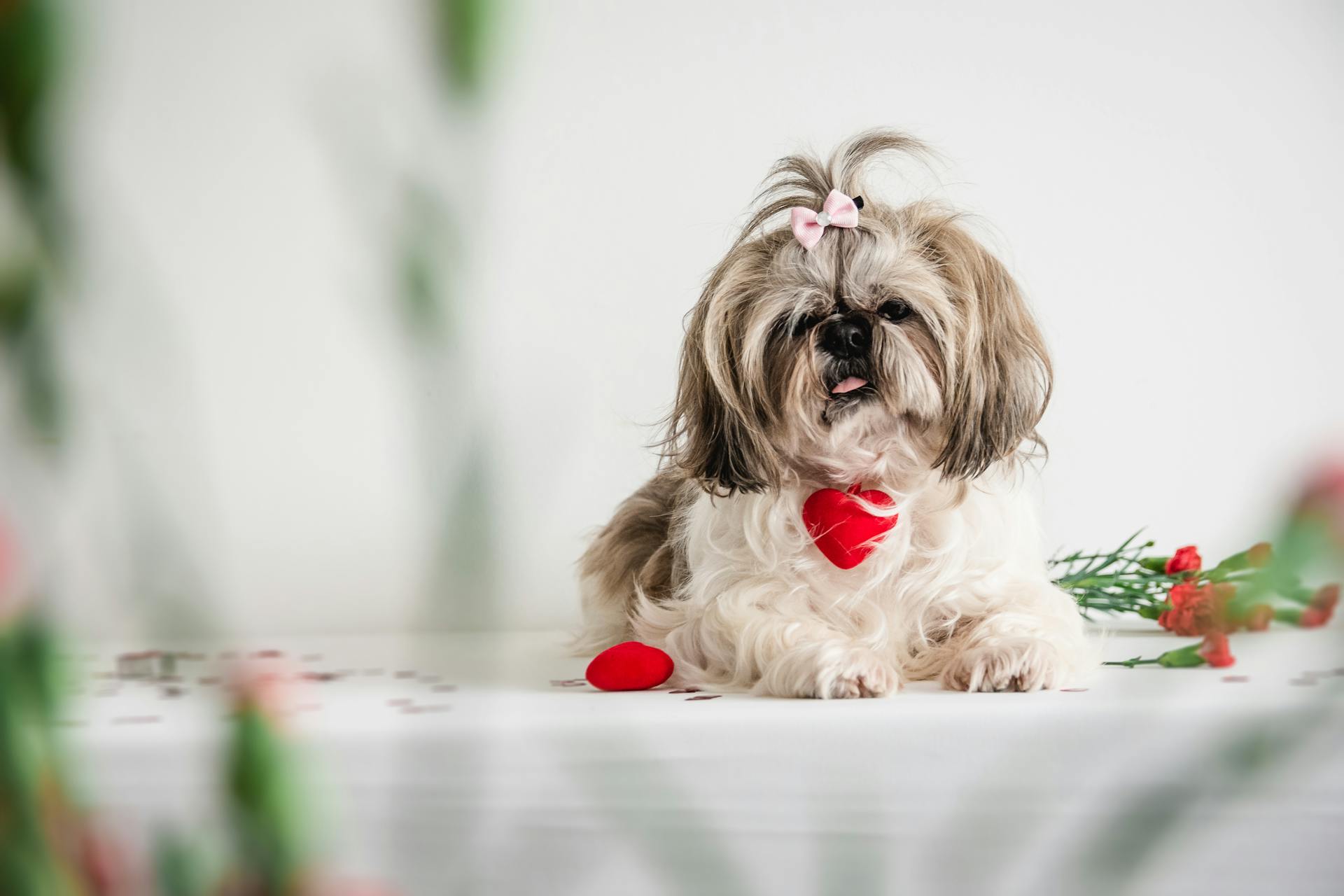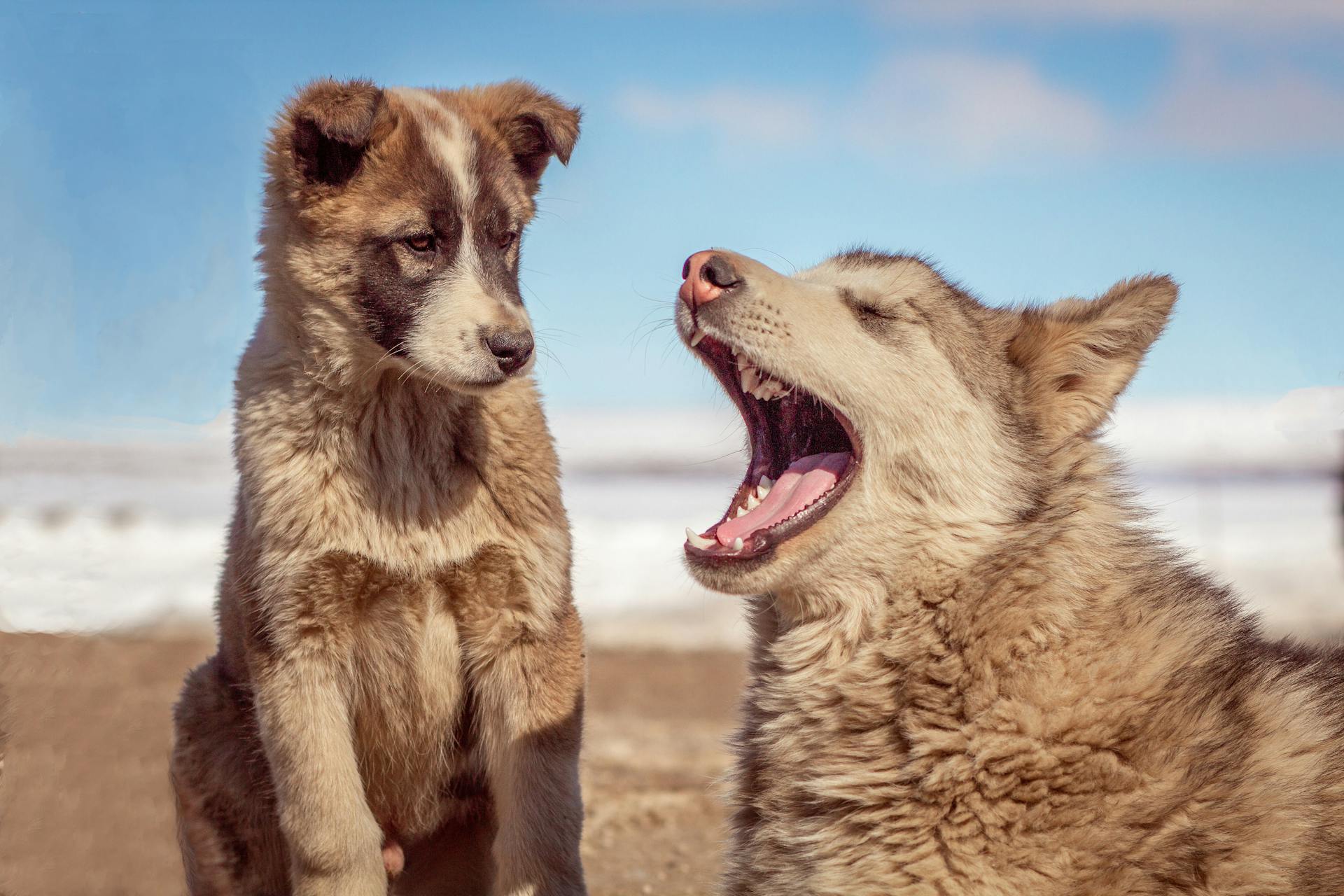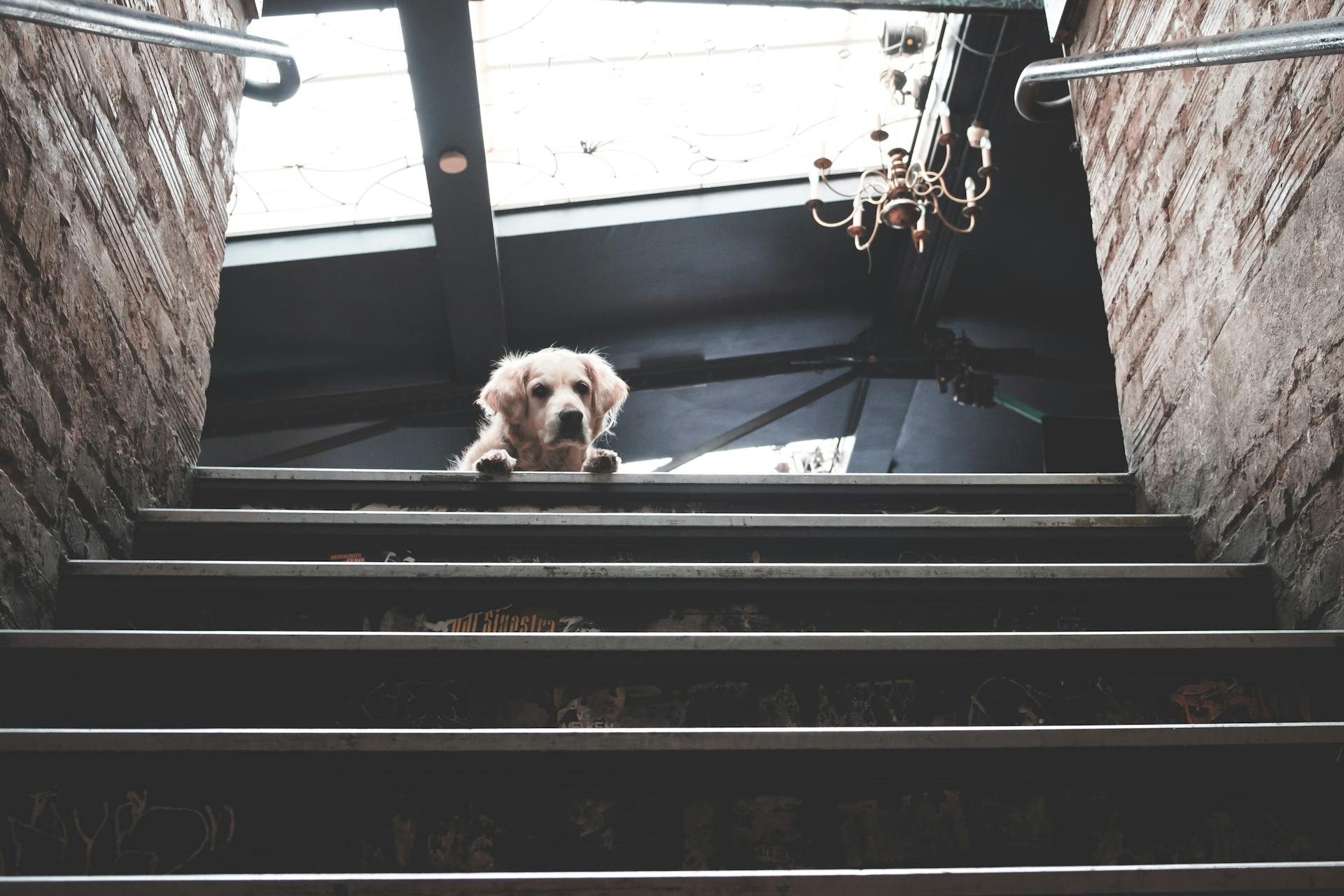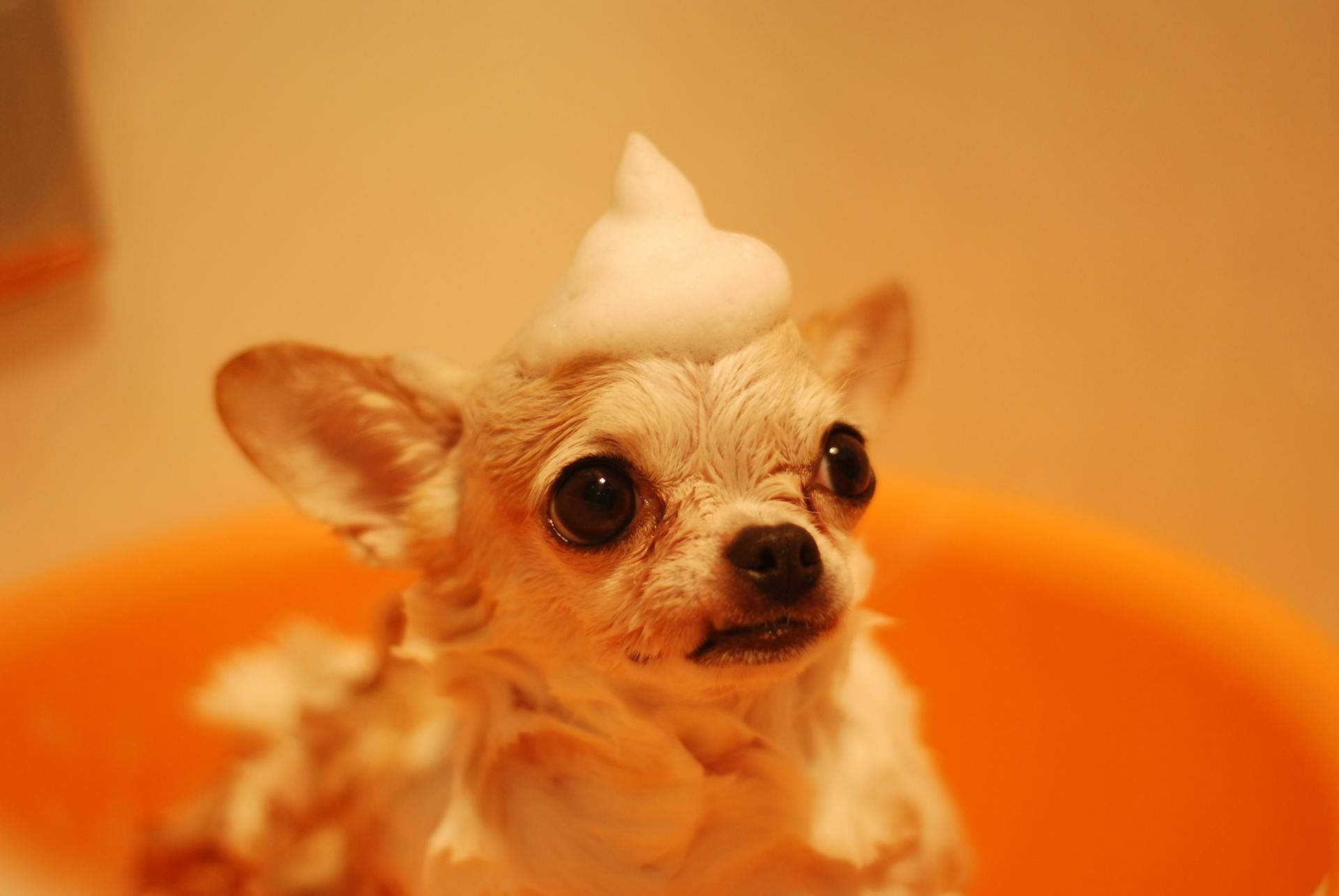
Owning an old Shih Tzu can be a truly rewarding experience, but it requires some special care and attention.
Old Shih Tzus can live up to 16 years or more, so it's essential to be prepared for a long-term commitment.
Their small size is a blessing, as they require less space to move around, but they still need regular exercise to stay healthy.
A short walk or playtime indoors can help keep them active and engaged.
As they age, old Shih Tzus may need more frequent veterinary check-ups to monitor their health and catch any potential issues early.
Their calm and gentle nature makes them a great companion for seniors or people who live in apartments.
See what others are reading: Shih Tzu Good with Kids
Health Issues
Old Shih Tzus can be prone to eye problems, with eye issues common at any age, and more so as they get older. Some Shih Tzus develop cataracts, which can be corrected with surgery.
The distinctive large eyes of Shih Tzus can easily be scratched, causing an ulcer. Excessive tear production is also common, leading to tear stains around the eyes. Shih Tzus are also prone to epiphora, where the fur on the eyelids scratches the conjunctiva and cornea.
Here are some common eye problems in Shih Tzus:
- Red eyes
- Bulging eyes
- Eye discharge
- Rubbing the eyes
- Cloudy eyes
- Squinting
- Blindness
It's essential to contact a veterinarian if you have any concerns about your dog's eyes. Regular check-ups can help prevent and detect eye problems early on.
Additional Age-Related Problems
As your Shih Tzu ages, it's essential to be aware of the additional health issues they may face. Difficulty hearing is a common problem that can start around the ninth or tenth birthday. You may notice your dog ignoring commands or failing to turn up at the sound of a treat bag crinkling.
Incontinence is another issue that can arise as your Shih Tzu ages. After years of perfect potty training, it can be challenging to accept that your senior dog may not have the same holding power. Some older dogs seem to simply forget their routine, requiring more frequent trips outside or the use of dog diapers or piddle pads.
Dementia can also affect senior Shih Tzus, causing memory problems, changes in mood and activity level, and incontinence. If you notice changes in your dog's behavior, it's crucial to consult with your veterinarian to rule out this condition. They can recommend prescribed medications, dietary changes, and supplements to manage Canine Dementia.
Intriguing read: Senior Boston Terrier
Here are some signs to watch out for:
- Memory loss or confusion
- Changes in mood or activity level
- Incontinence
Keep in mind that every dog is different, and not all senior Shih Tzus will experience these issues. However, being aware of the potential problems can help you provide the best possible care for your aging companion.
Ear Issues
Shih Tzus are prone to ear infections due to their long coat and hair growth in their ears. This can lead to recurring infections and more serious health issues if left unaddressed.
Their floppy ears are a major contributor to this problem, as they trap moisture and create an ideal environment for bacteria and fungus to grow.
Regular ear cleaning with a vet-approved ear cleaner can help reduce the risk of ear infections. This should be done frequently, especially after swimming or bathing.
Excessive hair growth inside the ear canals can cause irritation, so it's essential to have your veterinarian or groomer check and remove any unwanted hair if necessary.
The average Shih Tzu lifespan is 10-18 years, which is a testament to their overall healthiness as a breed. However, regular ear care is crucial to preventing ear infections and ensuring their long lifespan.
Periodontal Disease
Periodontal disease is commonly seen in Shih Tzu dogs because their teeth can easily overcrowd their small mouths. This overcrowding leads to tartar and plaque development.
Their small mouths make it easy for their teeth to overcrowd, causing problems. Routine teeth brushing, professional dental cleanings, and surgical removal of any problematic teeth will help keep your Shih Tzu’s mouth healthy.
It’s essential to brush your Shih Tzu’s teeth every day with a dog-safe toothpaste and brush. This daily habit will help prevent periodontal disease.
Regular veterinary appointments are crucial to monitor your dog’s mouth and recommend professional cleanings under anesthesia when necessary. Your vet can also check for any signs of dental problems.
Recommended read: Japanese Chin Dog Health Problems
Senior Care
As your Shih tzu ages, it's essential to start with a trip to the vet to rule out serious problems.
A senior Shih tzu needs special care to overcome the challenges that come with age.
Being attentive and offering extra support can make a big difference in your dog's golden years.
At home, you can do much to improve your dog's quality of life by providing extra comfort and care.
A trip to the vet will help identify any underlying issues that may be affecting your dog's health.
Nutrition and Feeding
As an old Shih Tzu owner, I've learned that nutrition and feeding are crucial for their health and well-being. It's essential to feed them a breed-appropriate food twice a day, sticking to the portion size guidelines.
Shih Tzus can be prone to obesity, so it's vital to avoid overfeeding and give them plenty of exercise. A combination of dry kibble and a moist food will give them some variety and help keep your Shih Tzu healthy.
Your veterinarian can help calculate the appropriate daily calories your pet should eat to avoid weight gain. When choosing a diet, choose a small-breed food to allow for easy chewing.
Shih Tzus are prone to periodontal disease, so feeding them dry kibble instead of canned food can help lessen the risk. A dental-specific diet can also be beneficial.
If your Shih Tzu is eating a dog food that meets the Association of American Feed Control Officials (AAFC) guidelines, they shouldn't need any extra supplementation unless recommended by your veterinarian.
Broaden your view: What to Feed Shih Tzu
Here are some key feeding tips to keep in mind:
- Feed your Shih Tzu twice a day, with a breed-appropriate food
- Consider feeding a combination of dry kibble and moist food for variety
- Choose a small-breed food for easy chewing
- Feed dry kibble instead of canned food to help prevent periodontal disease
- Consider a dental-specific diet for extra oral health benefits
- Consult with your veterinarian to determine the right daily calorie intake for your Shih Tzu
Grooming and Care
Grooming is a crucial aspect of caring for an old Shih Tzu. Regular grooming can help prevent matting and tangling of their long, luxurious coat, which can be a challenge as they age.
Shih Tzus don't shed much, but they do require regular brushing to prevent matting and tangling. Brushing should be done at least a few times a week, but daily brushing is ideal.
Their coat needs to be trimmed and brushed regularly, and routine professional grooming should be part of your budget to either maintain the long hair coat or to shave it into a cute Shih Tzu haircut periodically.
To keep their eyes clean and dry, the hair around their eyes should be trimmed or pulled up with a hair tie to avoid any eye irritation. Regular cleaning with a vet-approved ear cleaner can also help reduce the chances of ear infections.
Here's a quick rundown of the grooming needs of an old Shih Tzu:
- Brush their coat at least 3-4 times a week
- Trim the hair around their eyes to prevent irritation
- Clean their ears regularly to prevent infections
- Brush their teeth daily with dog-safe toothpaste and brush
Skin Imperfections

Shih Tzus will grow lumps and bumps with age, but most are nothing to worry about and can be easily managed with a vet's check-up.
As your Shih Tzu gets older, it's essential to take care that their harness isn't rubbing any skin growths, which can cause bleeding or scabbing.
Some lumps and bumps may need to be removed if they're in an unavoidable area or interfere with their hairstyle.
Grooming can be painful for senior dogs with lumps and bumps, so it's crucial to notify your groomer of spots that need extra care.
Running a clipper over a lump or bump can cause bleeding or even lead to infection, so the groomer will need to go around certain spots with extra care.
A unique perspective: Can Shiba Inu Hit 1 Cent
Coat Care
Shih Tzus have a luxurious coat that grows continuously and needs to be trimmed and brushed regularly.
Their coat can be a variety of colors including black, white, and red.
Shih Tzus don't shed much, but they do need to be brushed at least a few times each week, preferably daily.
Regular brushing can help prevent matting and tangling of their fur.
To keep their coat looking its best, routine professional grooming should be part of your budget.
You can choose to either maintain their long hair coat or shave it into a cute Shih Tzu haircut periodically.
Here's a rough guide to help you plan your Shih Tzu's grooming schedule:
By following this schedule, you can help keep your Shih Tzu's coat looking healthy and beautiful.
Ear Care
Shih Tzus are prone to ear infections due to hair growing inside their ear canals, which holds onto moisture and causes inflammation and infection by bacteria, fungus, or both.
Regular ear cleaning with a vet-approved ear cleaner can help reduce the chances of ear infections.
Dental Care
Brushing your Shih Tzu's teeth every day is crucial for their oral health.
You'll need a dog-safe toothpaste and brush to do the job properly.
Regular veterinary appointments will help your vet monitor your dog's mouth and recommend professional cleanings under anesthesia when necessary.
Personality and Training
Old Shih Tzus are known to be people pleasers and are usually easy to train. They thrive on high-reward treats and positive reinforcement during training sessions.
Shih Tzus are intelligent and want to please their pet parents, making them responsive to training. However, they can have a stubborn streak, so it's essential to start training from 8 weeks old.
To keep your old Shih Tzu engaged and entertained, try playing hide and seek or a "lucky dip" game. These activities will provide mental stimulation and keep them active.
Here's a quick reference guide to training your old Shih Tzu:
- Training sessions should be short, around 5-10 minutes.
- Keep track of treats given to avoid overfeeding and weight gain.
- Provide plenty of opportunities for exercise and rest, especially in summer.
Old Shih Tzus can be prone to separation anxiety, so it's best to keep them company as much as possible. With patience, consistency, and positive reinforcement, you can help your old Shih Tzu develop good habits and a strong bond with you.
Temperament & Personality
Shih Tzus are bred to be companions, which means they thrive on human interaction and attention. They're happiest when they're at your feet or side, so if you're away from home for long periods, this breed might not be the best fit.
Shih Tzus are social animals and need lots of socialization as puppies to feel comfortable around strangers. They can be wary of new people, so it's essential to introduce them to new faces gradually.
Shih Tzus are generally comfortable with other dogs and pets, but introductions should be done carefully to prevent any conflicts. They're also great with children, but it's crucial to supervise playtime and ensure it's not too rough.
Shih Tzus are playful, intelligent, and love to please their owners. They're adaptable and can adjust to different lifestyles, from a sedentary routine to a more active one.
Here are some key traits to consider when thinking about bringing a Shih Tzu into your family:
- Shih Tzus are affectionate and playful, but can be stubborn at times.
- They're best suited for owners who can be home most of the time.
- They need lots of socialization as puppies to feel comfortable around strangers.
- They're generally comfortable with other dogs and pets, but introductions should be done carefully.
- They're great with children, but playtime should be supervised.
Overall, Shih Tzus make loyal and loving companions for families with children and other pets.
Kennel Club Differences
The Shih Tzu's temperament is shaped by its history as a palace dog in Tibet and China, making them naturally friendly and outgoing.
There is a difference between the Shih Tzu of the American Kennel Club and the Kennel Club (UK).
In terms of size, the American Kennel Club recognizes a weight range of 9-16 pounds, while the Kennel Club (UK) recognizes a weight range of 4-7 kilograms.
The Shih Tzu's small size requires careful consideration when it comes to exercise and training.
Despite their small size, Shih Tzus are known to be lively and energetic, requiring daily walks and playtime to keep them happy and healthy.
Their outgoing personalities make them excellent companions for families and individuals alike.
Related reading: Norfolk Terrier Puppies Uk
Frequently Asked Questions
Can Shih Tzu live 20 years?
While 20 years is a possible lifespan for a Shih Tzu, the average life expectancy is shorter, and proper care can significantly impact their longevity. With the right attention to health, diet, and living conditions, Shih Tzus can live well into their teens.
What is the most common cause of death in Shih Tzus?
The most common causes of death in Shih Tzus are gastrointestinal diseases, heart disease, and poor quality of life, each accounting for 7.9% of fatalities. Understanding these common causes can help you provide the best possible care for your Shih Tzu.
Featured Images: pexels.com


